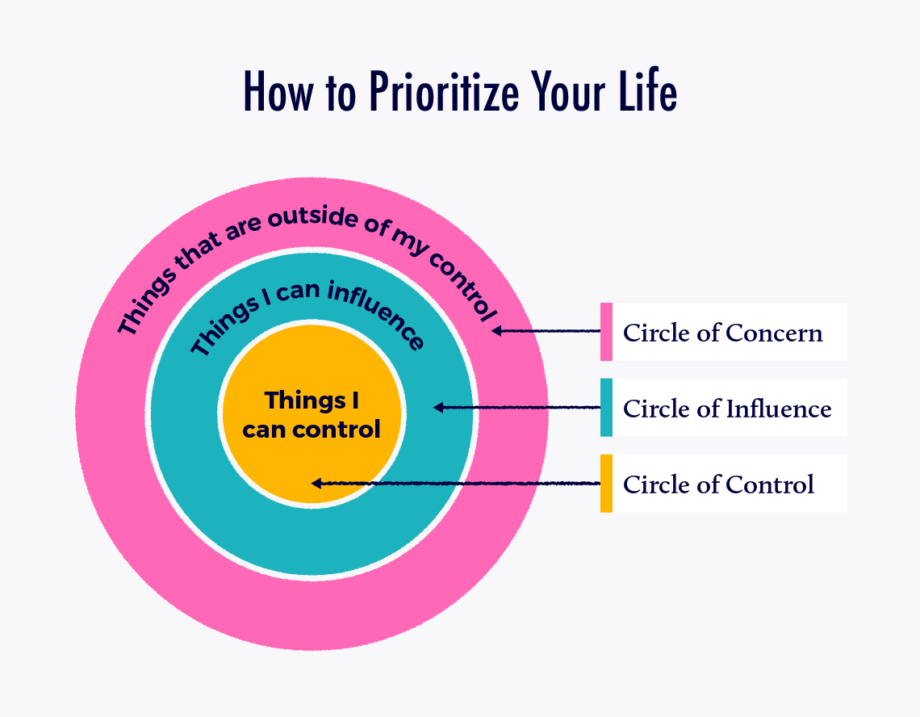Every great leader exhibits four distinct leadership rhythms:
- Proactivity in planning.
- Effectiveness in communication.
- Diligence in preparation.
- Excellence in execution.
When these rhythms are accompanied by distinct character traits, exceptional leaders emerge.
1. Proactivity in Planning
Imagine your life separated into 3 separate concentric circles: the circle of control, the circle of influence and the circle of concern.

Great leaders focus on the two inner circles: control and influence. They are aware of the circle of concern, but they refuse to fall into the deadly trap of engaging with it.
Why?
Because that’s where reactivity lies, and reactivity is where irrelevant / forgotten / bad leaders go.
Proactivity lies within the circles of control and influence. And that’s where great leaders focus their energy and effort.
What does it look like to live in that space?
- You put together a vision of the future, break it down into broad pictures and then clearly define the path to get there.
- You have a mindset that says a little done today is better than all of it done at once tomorrow.
- You write constantly, because more writing leads to clearer, better thinking. I’ve never met a great, proactive leader who didn’t spend a lot of their time writing.
- You publish thoughtful agendas well ahead of meetings and clearly delineate between items for discussion vs. items that need a decision.
- You signal important upcoming events well ahead of time and put plans in motion to execute.
- You set dates for progress and put accountability structures in place to ensure progress happens.
Each of these items directly correlates to something you can either control or influence.
When you focus on those two areas, you naturally evolve into a proactive planner. You exercise your sense of agency to shape the future rather than retreat to reactivity while someone else shapes the future for you.
2. Effectiveness in Communication
Great leaders are effective communicators.
What’s the secret to effective communication?
The answer is surprising.
Effective communicators are exceptional listeners.
Why listening?
When you spend time listening to understand rather than listening to respond, you learn to engage the heart of the situation rather than the surface of the conversation.
You discover how to rephrase content and inject emotion in a way that makes people feel like you understand them.
And that shouldn’t be surprising if you are listening to understand, not to respond.
Great leaders are effective communicators because they listen well.
3. Diligence in Preparation
Details matter.
Great leaders care deeply about the details.
If you’ve ever had an experience that failed to meet your expectations, it was because of a breakdown in preparation.
You might be tempted to think it was due to issues with execution, but poor execution is always preceded by poor preparation.
Diligence in preparation defines the parameters of success, determines all the ways plans can fail and accounts for them.
This rhythm separates the thinking from the doing, and in the process, it clarifies what must happen in order for something to have a chance at succeeding.
Once clear, great leaders that exhibit this rhythm get to work aligning vision, plans and resources to set the stage for execution.
4. Excellence in Execution
Excellence is created twice: first in the mind, then in the world.
Excellence is a byproduct of proactive planning, effective communication and diligent preparation.
It’s the public representation of incalculable private victories.
Respected leaders execute relentlessly and demand excellence as the only operating standard.
Excellence in execution often involves these components:
- Simplification. Most plans executed with excellence have been simplified to their most necessary parts (with intense focus placed on those parts).
- Punctuality. There’s a timeliness to activity: milestones are met, deadlines are hit and tasks are well coordinated along the way.
- Intentionality. It doesn’t just “happen”. Somebody is a driving force to make sure excellence is achieved.
What does it take to become this kind of leader with these rhythms?
I think you could sum it up this way:
Be the leader people want to follow.
To developing better leadership rhythms,
Thomas

Get the Better Leader Newsletter Delivered Directly to Your Inbox!
Join 9,227+ leaders taking the right steps to grow in their leadership. No spam – just real, thought-provoking stories and advice to make you a better leader. Grow in your leadership by subscribing today!
All Newsletters
Read past issues of The Better Leader Newsletter.






Leave a Reply